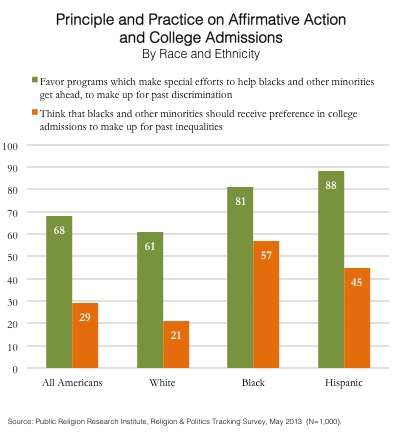I. Americans support the principle of affirmative action
Americans strongly support the principles behind affirmative action policies aimed at helping racial and ethnic minorities. More than two-thirds (68%) of Americans favor programs which, in order to make up for past discrimination, make special efforts to help blacks and other minorities get ahead, while 24% are opposed.
There is a large partisan gap on this question. Eighty-five percent of Democrats and 62% of independents favor affirmative action programs, compared to only a slim majority (51%) of Republicans.
Majorities of all religious groups, including 8-in-10 (80%) minority Protestants, 71% of Catholics, 66% of religiously unaffiliated Americans, 65% of white mainline Protestants, and 60% of white evangelical Protestants, favor programs which make special efforts to help blacks and other minorities get ahead in order to make up for past discrimination.
There is significant support for affirmative action programs across racial lines: 88% of Hispanic Americans, 81% of black Americans, and 61% of white Americans are in favor.
Young adults (age 18-29) are more likely than seniors (age 65 and older) to support affirmative action programs (75% vs. 63%).
 Despite this strong support for the general principle of affirmative action, few Americans support preferences based on race or ethnicity in college admissions. Fewer than 3-in-10 (29%) Americans believe that blacks and other minorities should receive preference in college admissions to make up for past inequalities, while 64% are opposed to such a policy.
Despite this strong support for the general principle of affirmative action, few Americans support preferences based on race or ethnicity in college admissions. Fewer than 3-in-10 (29%) Americans believe that blacks and other minorities should receive preference in college admissions to make up for past inequalities, while 64% are opposed to such a policy.
Even among those who support affirmative action programs generally, only 38 percent support preferences based on race or ethnicity in college admissions, and nearly 6-in-10 (57 percent) are opposed.
Eight-in-ten (80%) Republicans, two-thirds (67%) of independents, and a majority (53%) of Democrats oppose racial preferences in college admissions.
The race gap is much larger on this question. A majority of blacks (57%) and nearly half of Hispanics (45%) favor racial preferences in college admissions, compared to only 21% of whites.
II. Few Americans Believe They Have Been Negatively Affected by Affirmative Action
Few Americans perceive that they have been affected either positively or negatively in the college admission process due to their race or ethnicity. Six percent of Americans believe they were helped, a roughly equal number (7%) say they were hurt, and 80% say that their race or ethnicity made no difference.
Even among black Americans, who are, overall, the strongest supporters of affirmative action in college admissions, do not believe their race has played much a role in their own admission process. Only 16% say they were helped because of their race, while 8% say they were hurt. Hispanic Americans are about as likely to report that their ethnicity was an advantage (11%) as a disadvantage (7%).
Few (6%) white Americans, who overwhelmingly oppose affirmative action in college admissions, perceive that their race hurt their chances of being admitted to college.
Most Americans are also unlikely to believe that their careers have been impacted either negatively or positively due to their race or ethnicity. Seven percent say they have been helped in their job or career because of their race, 11% say they have been hurt, and 8-in-10 (80%) say it has not made a difference.
Black Americans (20%) and Hispanic Americans (17%) are more than twice as likely as whites (7%) to report that their race or ethnicity negatively affected their career.
Americans are divided over whether the Supreme Court should take public opinion into account when making decisions. Nearly half (47%) report that the Court should consider only legal issues when rendering judgments in an important constitutional case, and roughly the same number (45%) report that the Supreme Court should consider what the public thinks on the subject.
Republicans (57%) are significantly more likely than Democrats (43%) and independents (45%) to say that the Court should consider only legal issues. Nearly half of Democrats (49%) and independents (46%) believe the Court should take public opinion into account, compared to only 39% of Republicans.
Young adults (62%) are significantly more likely than seniors (38%) to say that the Court should consider public opinion when rendering decisions.
College graduates (64%) are significantly more likely than those without any college education (36%) to say that the Court should consider only legal issues.
III. Most Americans See Supreme Court as Political Entity
Very few Americans see the Supreme Court as operating above the political fray. Most Americans believe that Supreme Court justices are influenced by their own political views when making decisions. Fifty-five percent of the public say that justices are influenced a lot, about one-third (32%) say they are influenced a little, and only 8% say they are not influenced at all by their political views. There is widespread agreement on this question across most political, religious and demographic groups.
Fewer Americans believe that Supreme Court justices are influenced a lot by their religious beliefs. Less than 4-in-10 (37%) Americans say that Supreme Court justices are influenced a lot by their religious beliefs, 44% say they are influenced a little, and 15% say they are not influence at all.
Religiously unaffiliated Americans (44%) and Catholics (39%) are more likely than white mainline Protestants (27%) to say that Supreme Court justices are influenced a lot by their religious beliefs. Among white evangelicals, roughly one-third (34%) report that Supreme Court justices are influenced by their religious beliefs.
IV. Support for Same-sex Marriage and Employment Nondiscrimination
A slim majority (52%) of Americans support allowing gay and lesbian couples to marry legally, while 43% are opposed.
A slim majority (51%) of white mainline Protestants, more than 6-in-10 (62%) Catholics, and roughly three-quarters (73%) of religiously unaffiliated Americans favor allowing gay and lesbian couples to marry legally. In contrast, only 36% of minority Protestants and about one-quarter (26%) of white evangelical Protestants favor same-sex marriage. More than 7-in-10 (71%) white evangelical Protestants oppose allowing gay and lesbian couples to marry legally.
Roughly three-quarters (73%) of Americans favor laws that would protect gay and lesbian people from employment discrimination, compared to 22% who are opposed.
Majorities of every major religious group favor employment discrimination protections for gay and lesbian people, including white evangelical Protestants (59%), minority Protestants (61%), white mainline Protestants (75%), Catholics (76%), and religiously unaffiliated Americans (84%).
Majorities of Republicans, independents, and Democrats also favor this policy. Eight-in-ten Democrats (80%), three-quarters (75%) of independents, and 6-in-10 (60%) Republicans favor laws that would protect gay and lesbian people against job discrimination.
Americans are closely divided over whether gay and lesbian Americans who are legally married to non-citizens should be allowed to sponsor their spouse for residency, as heterosexual married Americans are allowed to do. Forty-five percent of the public favors such a policy, while 49% are opposed.
Religious and political differences closely resemble divides over the legality of same-sex marriage. Half (50%) of Catholics and about two-thirds (68%) of the religiously unaffiliated Americans favor a policy that allows gay and lesbian Americans to sponsor their spouses for citizenship, compared to 39% of white mainline Protestants and less than one quarter (23%) of white evangelical Protestants.
More than 7-in-10 (71%) Republicans oppose allowing gay and lesbian Americans who are married to non-citizens to sponsor their spouse for residency, while nearly 6-in-10 (57%) Democrats are in favor. Independents are evenly divided, with 47% in favor and 46% opposed.
Recommended citation:
Jones, Robert P., Daniel Cox, and Juhem Navarro-Rivera. “Americans Divided between Principle and Practice on Affirmative Action.” PRRI. 2013. http://www.prri.org/research/may-2013-religion-politics-tracking-survey/.


